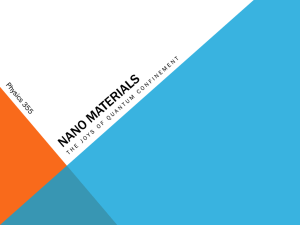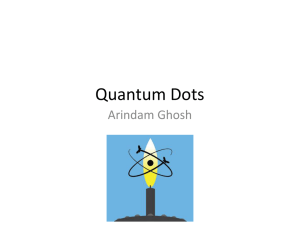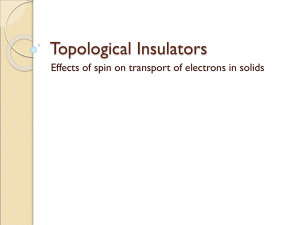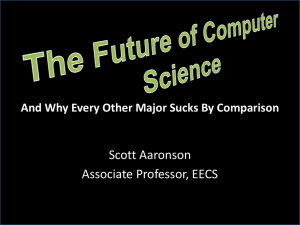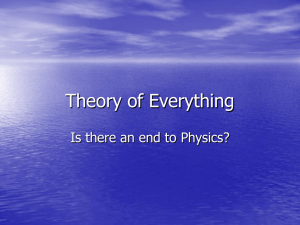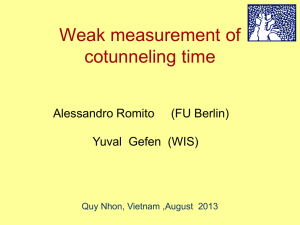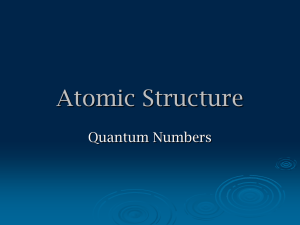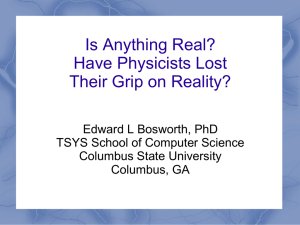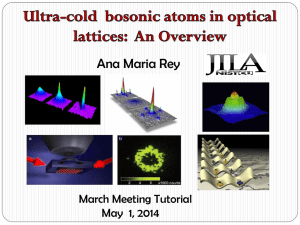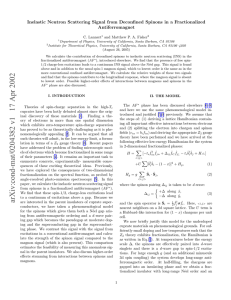pptx - Institute for Quantum Matter
advertisement
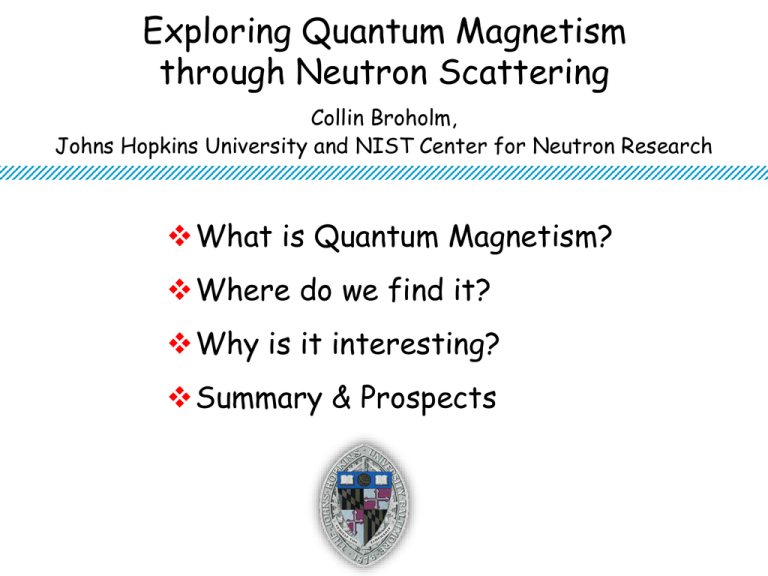
Exploring Quantum Magnetism through Neutron Scattering Collin Broholm, Johns Hopkins University and NIST Center for Neutron Research What is Quantum Magnetism? Where do we find it? Why is it interesting? Summary & Prospects Magnetism & Quantum Magnetism Ferromagnetism : Fundamental & essential collective phenomenon — macroscopic semi-classical dynamics Non-magnetic materials: intra-atomic singlet formation Quantum Magnetism: — Inter-atomic singlet formation — Macroscopic singlet formation — Strong correlations without static order — Emergent quantum particles — Quantum T=0 Phase Transitions 1 2 Overview of quantum magnetism Fundamental Questions: – What types of collective phases are possible – What are the corresponding quasi-particles Elements of the research – Materials Synthesis (bulk and nano-structured) – Advanced Characterization – Theory Applications – Model systems for quantum correlated physics – Sensors and filters via strong collective response – Quantum computing by manipulating emergent quasi-particles Probing matter through scattering pf Q 1 Q Q p p p p 1 2 i f i f Q i EEi f E f Q 1 QQ2 E Q 2 Intensity ћw Single Particle Process pi Q Intensity ћw Multi Particle Process May 6, 2009 ICNS 2009 Q 4 Quasi-particles “live” within solids Bound spinons in spin-1 chain Free spinons in spin-1/2 chain ≈ 10 mm ≈ 40 mm Y2BaNiO5 Cu(C4D4N2)(NO3)2 ≈ 0.1 mm ZnCr2O4 May 6, 2009 Cu2(quinox)2Cl4 ICNS 2009 5 Acknowledgements G. Aeppli UCL C. D. Batista Los Alamos Y. Chen NIST D. C. Dender NIST T. Hong ORNL M. Kenzelmann PSI C. P. Landee Clarke University K. Lefmann Copenhagen Univ. Y. Qiu NIST & Univ. of Maryland D. H. Reich JHU C. Rische Univ. of Copenhagen J. Abalardo-Rodriguez NIST & Univ. of Maryland C. Stock ISIS M. B. Stone Penn State University M. M. Turnbull Clarke University G. Xu BNL I. Zaliznyak BNL Y. Zhao JHU + many more friends & colleagues Decoupled spin pairs: singlet ground state , 1 2 , , , , S tot 1 H JS1 S 2 1 2 JS tot 2 3 4 J 1 2 May 6, 2009 ICNS 2009 7 S 0 tot A mobile triplet exciton k B T J May 6, 2009 ICNS 2009 Xu et 8 al PRL (2000) Description of weakly interacting dimers A spin-1/2 pair with AFM exchange has a singlet - triplet gap: J S tot 1 S tot 0 Inter-dimer coupling allows coherent triplet propagation and produces well defined dispersion relation Triplets can also be produced in pairs with total Stot=1 May 6, 2009 ICNS 2009 9 Creating two triplets with one neutron Two magnons One magnon Tennant et al (2000) w (meV) Strongly Interacting Dimers in PHCC 2 max (C H N )Cu2Cl6 May 6, 2009 4 12 2 (PHCC) Stone et al. PRB (2001) Magnon decay in two-magnon continuum May 6, 2009 Stone et al. Nature (2006) Neutron Scattering from Spin-1/2 chains KCuF3: orb. order Tenant, Lake, Nagler (2005) SrCuO2: orb. order CuPzN: Pyrazine Stone et al., PRL (2003) q / 2 Zaliznyak et al (2004) Spinons on MACS Large monochromator & 20 analyzers Total ofK2.7 hours counting time T=1.6 3.5 hrs Counting T=5 K 3.5 hrs Counting MACS @ NCNR May 6, 2009 Disintegration of a spin flip Spinon May 6, 2009 Spinon /J w J From band-structure to bounded continuum Q () q () S Q , w 2 May 6, 2009 G SQ 2 w w Quantum Criticality: T is only energy scale TS qc , w A 1 exp( w / k B T ) Im Lake et al (2005) Lake et al (2005) w / k BT w / k BT Quantum Critical Spin-1/2 chain J 2 S 2 n S 2 n 1 J 1S 2 n 1S 2 n 2 n 1 2 3 4 5 May 6, 2009 0 J 2 J1 J 2 J1 Damle and Huse PRL (2002) Two & one-particle scattering in spin chains CuCl2.2(DMSO): 0 H 11 Tesla Spin-1/2 chains in a crystal Kenzelmann May 6, 2009 et al. PRL (2004) Why staggered field yields bound states Zero field state quasi-long range AFM order Without staggered field distant spinons don’t interact With staggered field solitons separate “good” from “bad” domains, which leads to interactions and “soliton” bound state May 6, 2009 Corner-sharing tetrahedra Hao & Tchernyshyov (2009) Triangular Frustration & weak connectivity stunt growth of correlations Quantum Magnetism Kagome Frustrating outcomes Lattice distorts Long range order ZnCr2O4 Weak disorder Spin freezing Stock et al. (2009) 40 K 15 K 1.5 K S. H. Lee et al. (2000) Nakatsuji et al (2006) Frustration + Fermions = spin liquid La2CuO4 Coldea et al 2001 k-ET2Cu2CN3 Kurosaki et al (2005) Summary Quantum magnetism: beyond spin to collective quantum correlations Stabilized by – Low dimensionality – Frustration – Proximity to metal insulator transition Examples – – – – Spin dimers: Propagating triplet excitons 2-magnon continuum and magnon decay Spinons and quantum criticality in spin-1/2 chain Spin-liquids beyond one dimension? Accelerated progress from new instruments May 6, 2009

